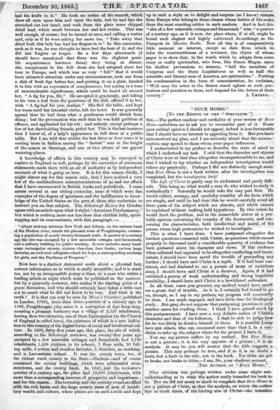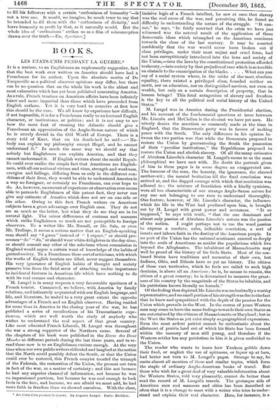" ECCE HOMO."
[To THE -EDITOR OF THE " SPECTATOR."] Sin,—The perfect candour and cordiality of your review of Ecce Homo emboldens me to ask you to reconsider part of it. From your critical opinion I should not appeal, indeed it is so favourable that I should have no interest in appealing from it. But you have misconceived my plan, and I am seriously afraid that the miscon- ception may spread to those whom your paper influences.
I endeavoured in my preface to describe the state of mind in which I undertook my task. I said that the character and objects of Christ were at that time altogether incomprehensible to me, and that I wished to try whether an independent investigation would relieve my perplexity. Perhaps I did not distinctly enough state that Ecce Homo is not a book written after the investigation was completed, but the investigation itself.
The Life of Christ is partly easy to understand and partly diffi- cult. This being so, what would a man do who wished to study it methodically? Naturally he would take the easy part first. He would collect, arrange, and carefully consider all the facts which are simple, and until ho had done this he would carefully avoid all those parts of his subject which are obscure, and which cannot be explained without making bold hypotheses. By this course he would limit the problem, and in the meanwhile arrive at a pro- bable opinion concerning the veracity of the documents, and con- cerning the characteristics, both intellectual and moral, of the person whose high pretensions he wished to investigate.
This is what I have done. I have postponed altogether the hardest questions connected with Christ, as questions which cannot properly be discussed until a considerable quantity of evidence has been gathered about his character and views. If this evidence when collected had appeared to be altogether conflicting and incon- sistent, I should have been saved the trouble of proceeding any further; I should have said Christ is a myth. If it had been con- sistent, and had disclosed to me a person of mean or ambitious aims, I should have said Christ is a deceiver. Again, if it had exhibited a person of weak understanding and strong impulsive sensibility, I should have said Christ is a bewildered enthusiast.
In all these cases you perceive ,my method would have sa.vell me a great deal of trouble. As it is, I certainly feel bound to go on, though, as I say in my preface, my progress will necessarily be slow. I am much engaged, and have little time for theological study. But pray do not suppose that postponing questions is only another name for evading them. I tbiuk I have gained much by this postponement. I have now a very definite notion of Christ's character and that of his followers. I shall be able to judge how far he was likely to deceive himself or them. Jt is possible I may have put others, who can command more time than I, in a con- dition to take up the subject where for the present I leave it. You say my picture suffers by my method. But Ecce Homo is not a picture ; it is the very opposite of a picture ; it is an analysis. It may be, you will answer that the title suggests a picture. This may perhaps be true, and if so it is no doubt a fault, but a fault in the title, not in the book. For titles are put to books, not books to titles.—I am, Sir, your obedient servant, THE AUTHOR OF " EccE Homo."
[Our criticism was perhaps written under some slight mis- understanding as to what the author really intended his book to be. But we did not mean so much to complain that Ecce Homo is not a picture of Christ, as that the analysis, on which the author lays so much stress, of the leading aim of Christ--the intention to fill his followers with a certain ' enthusiasm of humanity '—is not a true one. It would, we imagine, be much truer to say that he intended to fill them with the enthusiasm of divinity,' and leave humanity to profit by that, as it naturally would. But the whole idea of ' enthusiasm' strikes us as a film of misconception drawn over the truth.—En. Spectator.]































 Previous page
Previous page